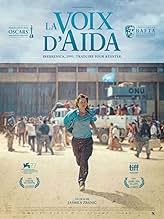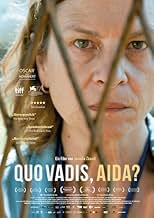CALIFICACIÓN DE IMDb
8.0/10
41 k
TU CALIFICACIÓN
Bosnia, 1995. Aida trabaja de traductora para la ONU en el pequeño pueblo de Srebrenica. Cuando el ejército serbio ocupa el pueblo, su familia está entre las miles de personas que buscan ref... Leer todoBosnia, 1995. Aida trabaja de traductora para la ONU en el pequeño pueblo de Srebrenica. Cuando el ejército serbio ocupa el pueblo, su familia está entre las miles de personas que buscan refugio en los campos de la ONU.Bosnia, 1995. Aida trabaja de traductora para la ONU en el pequeño pueblo de Srebrenica. Cuando el ejército serbio ocupa el pueblo, su familia está entre las miles de personas que buscan refugio en los campos de la ONU.
- Dirección
- Guionistas
- Elenco
- Nominado a 1 premio Óscar
- 40 premios ganados y 43 nominaciones en total
- Dirección
- Guionistas
- Todo el elenco y el equipo
- Producción, taquilla y más en IMDbPro
Resumen
Reviewers say 'Quo Vadis, Aida?' is a powerful, harrowing film about the Srebrenica massacre, praised for impactful storytelling and strong performances, especially Jasna Duricic as Aida. It critically examines the United Nations' failure and explores themes of war and survival. While lauded for emotional depth and historical significance, some criticize perceived inaccuracies and over-dramatization. It is considered an important, though challenging, film that highlights a significant historical event.
Opiniones destacadas
The Bosnian entry for the Best International Feature Academy Award, "Quo Vadis, Aida?" is better than the odds-on favorite to actually win the Oscar, "Druk" (a.ka. "Another Round," 2020), being that it's actually about something that matters and is emotionally devastating--so much so that the eponymous Aida literally begs to make a Sophie's Choice at one point. The protagonists in both are teachers, and neither one ultimately affects any real change, but one is living history while the other rambles to high-schoolers about his famous favorite fellow drunkards. Both pictures are alienating: this one forcing us to witness the horrific Srebrenica massacre that we're unable to alter, and the other makes one feel like the designated driver to a bunch of binge-drinking dolts whining about their so-called mid-life crises. As opposed to waiting impatiently to drive the inebriated teachers home, however, "Quo Vadis, Aida?" does well to pull the spectator into the chaos. There's nary a dull moment in following Aida (as played rivetingly well by Jasna Duricic--seriously, Academy, you missed a nominee) around a makeshift UN refugee camp as she frantically tries to save the lives of her husband and two sons from the approaching slaughter by Ratko Mladic's Bosnian Serb Army and as the United Nations and their so-called, shorts-wearing peace keepers impotently stand by and refuse to help.
I want to note, too, that Aida being a translator, or interpreter, as the case may be (that "piano player" as "messenger" part early on, e.g.), makes for an interesting dynamic in the subtitling of the picture, among other things--much of it disregarded as unnecessary because of it. There's actually a good deal of English here beside other languages. Another good reason for the Oscar category name change from "Foreign Language Film" to "International Feature."
Additionally, amid all that, writer-director Jasmila Zbanic and company also do something reflexively interesting cinematically. While the real war is nothing more than a one-sided genocide slaughtering Bosniak Muslim males, there's another battle here for the cinematic control of the narrative. On one side, there's Mladic with the cameraman he continually tells what to shoot, and who in return reassures the would-be convicted war criminal that he'll fix his inane monotony with montage. We never see that film here, though--only its making from the outside, where its propagandistic lies are all the more apparent. And, on the other side, we have the faces of the people in the outer, film proper that is "Quo Vadis, Aida?" We see this in intermittent series of return gazes--of people looking directly, or close to, at the camera and, thus, us, the audience. They're the victims of the genocide within the narrative and, as the case may be, interpreting the real tragedy onto the screen, but through these return gazes, seize control of the narrative. This is their movie.
I want to note, too, that Aida being a translator, or interpreter, as the case may be (that "piano player" as "messenger" part early on, e.g.), makes for an interesting dynamic in the subtitling of the picture, among other things--much of it disregarded as unnecessary because of it. There's actually a good deal of English here beside other languages. Another good reason for the Oscar category name change from "Foreign Language Film" to "International Feature."
Additionally, amid all that, writer-director Jasmila Zbanic and company also do something reflexively interesting cinematically. While the real war is nothing more than a one-sided genocide slaughtering Bosniak Muslim males, there's another battle here for the cinematic control of the narrative. On one side, there's Mladic with the cameraman he continually tells what to shoot, and who in return reassures the would-be convicted war criminal that he'll fix his inane monotony with montage. We never see that film here, though--only its making from the outside, where its propagandistic lies are all the more apparent. And, on the other side, we have the faces of the people in the outer, film proper that is "Quo Vadis, Aida?" We see this in intermittent series of return gazes--of people looking directly, or close to, at the camera and, thus, us, the audience. They're the victims of the genocide within the narrative and, as the case may be, interpreting the real tragedy onto the screen, but through these return gazes, seize control of the narrative. This is their movie.
I am a guy from Serbia and I gave this movie 10/10 because it has really good script and it is true work of art. I wish directors from Serbia would make more films which are as good as this one.
... because you never learn! The despicable, diabolical and disgusting events from Srebrenica, replayed many times before, currently playing out in several countries now, and quite probably for the foreseeable future while we continue to turn a blind eye, ignore, disengage or perhaps don't care. Jasna Djuricic as Aida, immense!
So horrible so horrible...
A war movie about the Srebrenica massacre in 1995. A mother, who's also an interpreter, tried to get her family to safety while the civilians were being transported by the Serbian force.
Coming in, I didn't know anything about the real life story. However, after watching about 10 to 15 minutes, it was abundantly clear what was going to happen. For the rest of the movie, it became a desperate, maddening, and heartbreaking descend into the inevitable. This was shown through the lens of our main character, and her desperation was relatable, like if you were in her shoes you would do everything she did.
The color and cinematography also heightened the desperation. The movie looked monotonous. The overwhelming color of the ground during the day felt hot, dry, and reflected the dire situation the civilians were in. Even more, the movie felt so raw, making me feel like I'm actually there with the people.
And then the ending hit. I knew it was coming, but still I was in silence as the camera slowly moved away. There's no need for showing actual violence. Just the sound was enough to convey the horror. The last scene was a strong testament of the director about the unjust event.
Overall, a devastating movie that i would not want to see again. 9/10.
A war movie about the Srebrenica massacre in 1995. A mother, who's also an interpreter, tried to get her family to safety while the civilians were being transported by the Serbian force.
Coming in, I didn't know anything about the real life story. However, after watching about 10 to 15 minutes, it was abundantly clear what was going to happen. For the rest of the movie, it became a desperate, maddening, and heartbreaking descend into the inevitable. This was shown through the lens of our main character, and her desperation was relatable, like if you were in her shoes you would do everything she did.
The color and cinematography also heightened the desperation. The movie looked monotonous. The overwhelming color of the ground during the day felt hot, dry, and reflected the dire situation the civilians were in. Even more, the movie felt so raw, making me feel like I'm actually there with the people.
And then the ending hit. I knew it was coming, but still I was in silence as the camera slowly moved away. There's no need for showing actual violence. Just the sound was enough to convey the horror. The last scene was a strong testament of the director about the unjust event.
Overall, a devastating movie that i would not want to see again. 9/10.
The film covers the topic on Srebrenica genocide, which was committed in 1995 in Bosnia. It is portrayed through a family story, with Aida, a translator for the UN, as the main character.
A sad, but an important lecture on what hatred can make people do.
¿Sabías que…?
- TriviaJasna Djuricic, who plays the main role, is the wife of Boris Isakovic, who plays general Mladic. They often work together in film and theater, but in this film they don't share any scenes.
- Citas
Aida Selmanagic: We are on the list!
- ConexionesFeatured in Los 93 Premios de la Academia (2021)
Selecciones populares
Inicia sesión para calificar y agrega a la lista de videos para obtener recomendaciones personalizadas
- How long is Quo Vadis, Aida??Con tecnología de Alexa
Detalles
- Fecha de lanzamiento
- Países de origen
- Sitios oficiales
- Idiomas
- También se conoce como
- Where are you going, Aida?
- Locaciones de filmación
- Productoras
- Ver más créditos de la compañía en IMDbPro
Taquilla
- Presupuesto
- EUR 4,500,000 (estimado)
- Total a nivel mundial
- USD 813,253
- Tiempo de ejecución1 hora 41 minutos
- Color
- Mezcla de sonido
- Relación de aspecto
- 1.85 : 1
Contribuir a esta página
Sugiere una edición o agrega el contenido que falta

Principales brechas de datos
By what name was Quo Vadis, Aida? (2020) officially released in India in Hindi?
Responda

![Trailer [OV]](https://m.media-amazon.com/images/M/MV5BNjFiN2EzNDItMzBiNy00YjI4LTkwM2YtN2YxYzcwYmYzYjIxXkEyXkFqcGdeQXRyYW5zY29kZS13b3JrZmxvdw@@._V1_QL75_UX500_CR0)






























